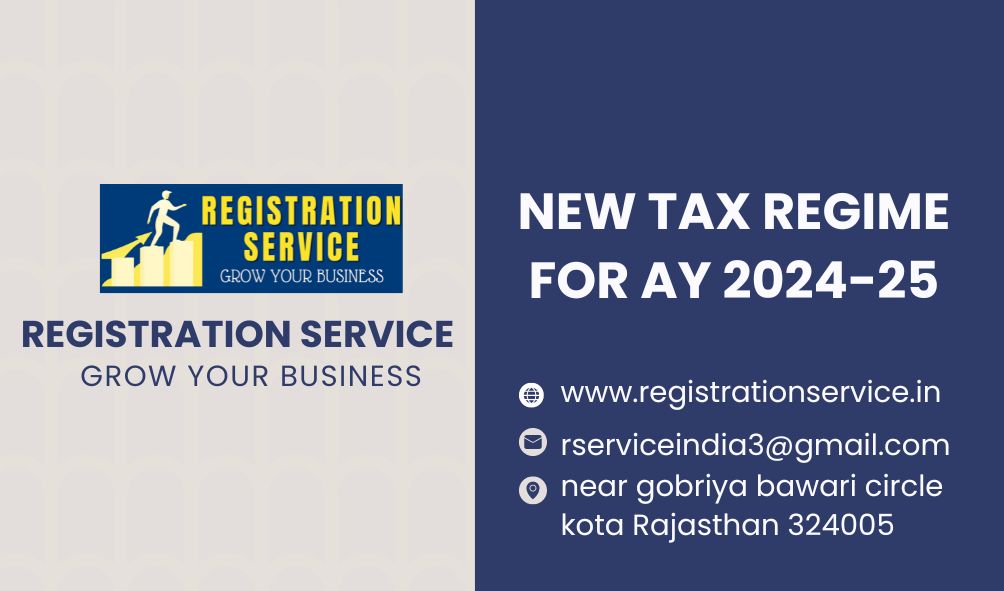Income Tax under the New Tax Regime: A Guide for Kota Residents (FY 2023-24)
New Tax Regime in India for AY 2024-25 (FY 2023-24)
Tax season is upon us, and with it comes the inevitable questions about income tax slabs and filing procedures. This comprehensive guide from Registration Service, your trusted partner in Kota (Registrationservice.in), focuses on the new tax regime for FY 2023-24, assessed in the assessment year (AY) 2024-25.
What Is an Income Tax Slab?
An income tax slab refers to a range of income levels used in the tax system of a country. Taxpayers are categorized into these slabs based on their annual income. Each income tax slab has a corresponding tax rate. The tax you pay is determined by the slab your total income falls into. This creates a progressive tax system, where people earning more income are taxed at a higher rate compared to those earning less.
Key Features:
Simplified Structure: No need to claim various deductions and exemptions, making filing easier.
Lower Tax Rates: Generally lower tax slabs compared to the old regime.
No Deductions/Exemptions: Popular deductions like HRA, LTA, Section 80C investments, and medical insurance premiums (Section 80D) are not allowed.
Benefits:
Potentially Lower Tax Liability: Especially for individuals with lower incomes who don’t utilize many deductions.
Reduced Time Commitment: Streamlined process saves time and effort during filing.
Drawbacks:
Limited Tax Savings: Loss of deductions and exemptions can increase tax burden for those who typically use them.
Less Flexibility: Limited tax planning opportunities compared to the old regime.
Who Should Consider the New Regime?
Individuals with income falling within the lower tax brackets.
Those who don’t utilize many deductions or exemptions available under the old regime.
People who find the simplified structure appealing.
Understanding the Income Tax Landscape
The new tax regime offers a simpler structure with lower tax rates. However, it comes with fewer deductions compared to the old regime. Here’s a quick breakdown:
Lower Tax Rates: The new regime boasts lower tax rates compared to the old regime, potentially reducing your overall tax liability.
Limited Deductions: Unlike the old regime, the new regime eliminates most deductions except for a standard deduction of ₹50,000.
Income Tax Slabs under the New Tax Regime (FY 2023-24):
| Total Income | Rate of Tax |
| up to 3,00,000 | Nil |
| 3,00,001- 6,00,000 | 5% |
| 6,00,001- 9,00,000 | 10% |
| 9,00,001- 12,00,000 | 15% |
| 12,00,001- 15,00,000 | 20% |
| 15,00,001 and above | 30% |
Changes announced by Indian government in the new tax regime in Budget 2023
The Budget 2023 focused on making the new tax regime more attractive for individual taxpayers in India. Here are the key changes announced:
Increased Basic Exemption Limit: The basic exemption limit under the new regime was raised to 3 lakh from 2.5 lakh. This means a larger portion of your income is exempt from tax.
Tax Rebate for Lower Income Earners: A tax rebate of 25,000 was introduced under Section 87A for individuals with a taxable income of up to 7 lakh. This effectively means anyone earning up to 7 lakh under the new regime wouldn’t have to pay any income tax.
Standard Deduction Extended: The standard deduction of 50,000, previously only available under the old regime, was extended to the new regime. This further reduces your taxable income.
Overall Impact:
These changes aim to simplify tax filing and incentivize individuals to move towards the new tax regime. With a higher exemption limit, tax rebate, and standard deduction, the new regime becomes more competitive for a wider range of taxpayers.
Here’s a table summarizing the changes:
| Change | Old Limit | New Limit |
| Basic Exemption Limit | 2.5 lakh | 3 lakh |
| Tax Rebate (for income up to) | Not Applicable | 7 lakh (with rebate of 25,000) |
| Standard Deduction | Not Applicable | Introduced (50,000) |
Surcharge on Income Tax in India
In India, a surcharge is an extra tax levied on top of your regular income tax under the new tax regime. It applies to individuals whose net taxable income exceeds Rs. 50 lakh. This surcharge is calculated on the income tax payable before adding the health and education cess. There are different surcharge rates depending on your income bracket under the new regime.
| Taxable Income (₹) | Surcharge Rate |
| Up to 50 lakh | Nil |
| 50 lakh – 1 crore | 10% |
| 1 crore – 2 crore | 15% |
| Above 2 crore | 25% |
–Income from dividends and Capital gains under sections 111A, 112A, and 115AD (highest surcharge capped at 15%)
–Association of Persons (AOP) consisting entirely of companies (surcharge capped at 15%)
Health and Education Cess (HEC)
An additional 4% health and education cess is applicable on the total tax amount (income tax payable + surcharge, if applicable). This cess is levied on the income tax payable, not on the total income itself.
Formula (with surcharge):
HEC = (Income tax payable + Surcharge) x 4/100
Formula (without surcharge):
HEC = Income tax payable x 4/100
Choosing the Right Regime for You in Kota:
The best tax regime for you depends on your income profile and the deductions you typically claim. Here are some factors to consider:
Income Level: If your income falls within the lower tax slabs (up to 10 lakh), the new regime with its lower tax rates might be beneficial.
Deductions: If you rely heavily on deductions under sections like 80C (investments), 80D (medical expenses), or HRA (house rent allowance), the old regime might be more suitable.
Investment Portfolio: If you rely heavily on deductions for investments like ELSS mutual funds or life insurance premiums (Section 80C), the old regime might be a better choice.
Key Points of the New Tax Regime (AY 2024-25):
Lower Tax Rates: Compared to the old regime, the new regime offers lower tax rates across different income brackets.
No Deductions or Exemptions: Unlike the old regime where you could claim deductions for investments (Section 80C), House Rent Allowance (HRA), medical expenses (Section 80D), etc., the new regime doesn’t allow for these deductions.
Standard Deduction: Instead of claiming itemized deductions, the new regime provides a standard deduction that simplifies tax filing.
Consulting a CA in Kota is Highly Recommended:
A Chartered Accountant (CA) can analyze your specific situation, including your income sources, deductions, and investment plans. They can then recommend the most tax-efficient regime for you, ensuring you maximize your benefits and minimize your tax liability.
Benefits of Choosing Registration Service in Kota:
CA Network: We connect you with a network of experienced CAs in Kota who can provide personalized tax advice.
Tax Return Preparation: Our team can assist you in preparing and filing your income tax return accurately and efficiently.
Compliance Support: We ensure you meet all tax deadlines and avoid penalties.
Let Us Navigate Tax Season for You!
Filing taxes can be overwhelming, but Registration Service is here to help. Contact us today, and we’ll ensure a smooth and stress-free tax filing experience for you in Kota. Remember, choosing the right tax regime and maximizing deductions can significantly impact your final tax liability. Don’t hesitate to seek professional guidance to optimize your tax situation.
Registration Service Provides the Following Services in Kota
Private Company Registration, Public company registration, Nidhi Company Registration, (FPO/FPC) Farmer Producer Company Registration, One person company (OPC) Registration, NGO – Section 8 Company Registration, LLP- Limited Liability Partnership Registration, Proprietorship Firm Registration, Partnership Firm Registration, Import Export Code (IEC), MSME Registration, BRN – Business Registration Number, Accounting Service, Income Tax Return, Salaried Return, Business Return, Share Market Return, Project Reports, Individual Audit, Company Audit, Company Compliances, GST Audit, GST Annual Filling, GST Registration, GST Return, PF Registration, PF Return, ESI Registration, ESI Return, Digital Signature certificate (DSC), Trademark Registration, Reply of Examination Report in Trademark Registration.
Registration service provides the income tax return service in the following cities of Rajasthan:
Income Tax Return In Ajmer
Income Tax Return In Alwar
Income Tax Return In Anoopgarh
Income Tax Return In Balotra
Income Tax Return In Banswara
Income Tax Return In Baran
Income Tax Return In Barmer
Income Tax Return In Beawar
Income Tax Return In Bharatpur
Income Tax Return In Bhilwara
Income Tax Return In Bikaner
Income Tax Return In Bundi
Income Tax Return In Chittorgarh
Income Tax Return In Churu
Income Tax Return In Dausa
Income Tax Return In Deeg
Income Tax Return In Dholpur
Income Tax Return In Didwana Kuchaman
Income Tax Return In Dudu
Income Tax Return In Dungarpur
Income Tax Return In Ganganagar
Income Tax Return In Gangapurcity
Income Tax Return In Hanumangarh
Income Tax Return In Jaipur
Income Tax Return In Jaisalmer
Income Tax Return In Jalore
Income Tax Return In Jhalawar
Income Tax Return In Jhunjhunu
Income Tax Return In Jodhpur
Income Tax Return In Karauli
Income Tax Return In Kekri
Income Tax Return In Khairthal-Tijara
Income Tax Return In Kota
Income Tax Return In Kotputli-Behror
Income Tax Return In Nagaur
Income Tax Return In Neem Ka Thana
Income Tax Return In Pali
Income Tax Return In Phalodi
Income Tax Return In Pratapgarh
Income Tax Return In Rajsamand
Income Tax Return in Ramganj Mandi
Income Tax Return In Salumbar
Income Tax Return In Sanchor
Income Tax Return In Sawai Madhopur
Income Tax Return In Shahpura
Income Tax Return In Sikar
Income Tax Return In Sirohi
Income Tax Return In Tonk
Income Tax Return In Udaipur

